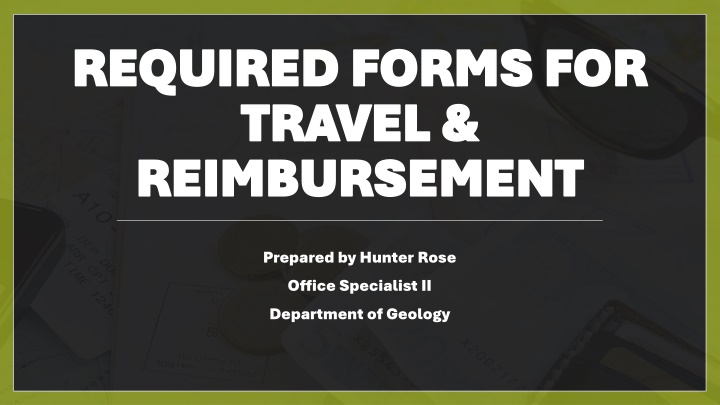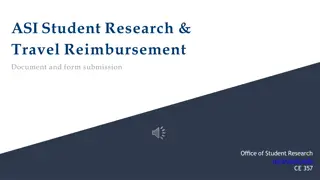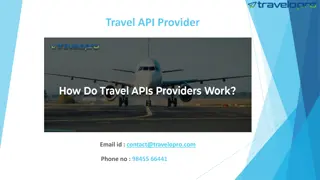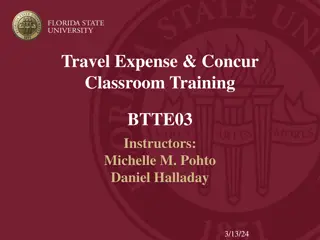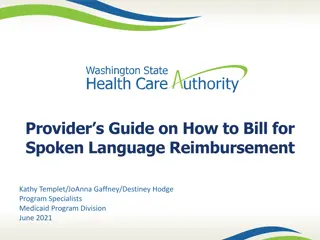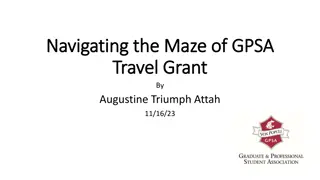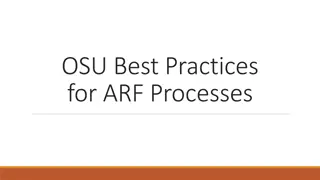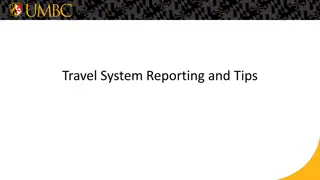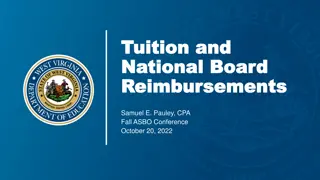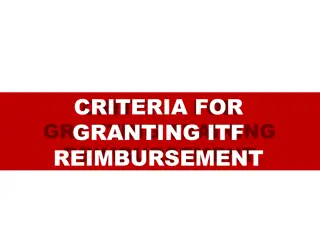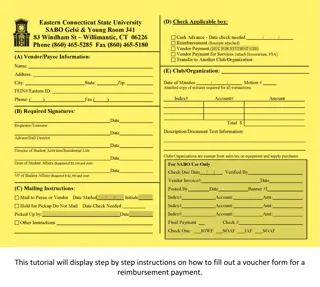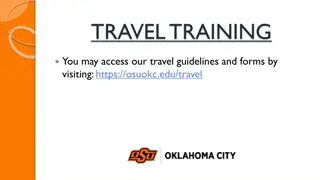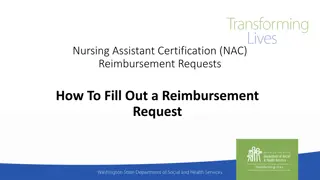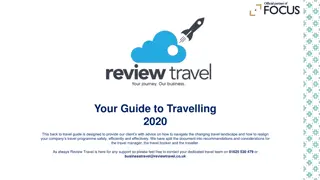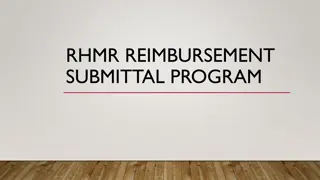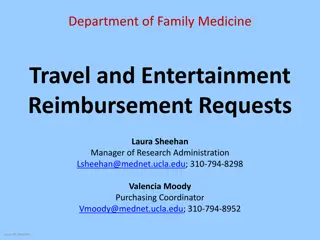Required Forms and Tips for Travel Reimbursement
The Travel Order Request (TOR) is essential for academic and professional travel, ensuring expenses are properly estimated and recorded. Submission deadlines, receipt guidelines, and per diem rates are key aspects covered in this comprehensive guide.
Download Presentation

Please find below an Image/Link to download the presentation.
The content on the website is provided AS IS for your information and personal use only. It may not be sold, licensed, or shared on other websites without obtaining consent from the author.If you encounter any issues during the download, it is possible that the publisher has removed the file from their server.
You are allowed to download the files provided on this website for personal or commercial use, subject to the condition that they are used lawfully. All files are the property of their respective owners.
The content on the website is provided AS IS for your information and personal use only. It may not be sold, licensed, or shared on other websites without obtaining consent from the author.
E N D
Presentation Transcript
REQUIRED FORMS FOR REQUIRED FORMS FOR TRAVEL & TRAVEL & REIMBURSEMENT REIMBURSEMENT Prepared by Hunter Rose Office Specialist II Department of Geology
What is a TOR? TOR (travel order request)is a mandatory form for any student, faculty, staff, or otherwise that will be traveling for official academic/professional purposes, such as conferences, field work, outreach, etc. It is required and especially important if you are receiving any kind of departmental support or reimbursement for your travel expenses. There are two sections the travel order request and the expense report. The travel order request is where you will estimate your expenses (e.g., cost of travel/airfare, transportation costs such as gas, bus passes, or rideshares, lodging, cost of food, conference registration, field work supplies, etc.) The expense report is where you will enter actual expenses using your receipts, which must also be provided in order for the associated expense to be covered.
Tips and tricks You must submit your TOR at least TWO (2) WEEKS prior to your departure. TORs submitted after the deadline will be scrutinized and may not be accepted. Add AdobeSign@AdobeSign.com to your safe senders list, or at least check your junk/spam email folder regularly for any emails from Shared Services/AdobeSign requiring signature and providing documentation for reimbursement/travel. DFS has worked hard on travel resources, and they have a website many questions you may have will likely already be addressed here https://www.k-state.edu/travel/ Please indicate your funding and maximum budget before you travel, and if you are getting a travel grant from GSC, Arts & Sciences, an honor society, etc., please include that information on your TOR. If you re not sure of your travel budget, discuss with Dr. Kempton or whoever else may be funding your travel (e.g., your thesis advisor).
Receipts KEEP YOUR RECEIPTS! YES, ALL OF THEM! Receipts must be itemized credit card authorization receipts will not be sufficient, nor will they be accepted by Shared Services. What should be visible on the receipt? The date, the vendor, the items/services purchased, the total cost, the method of payment, the last 4 digits of the card used (if possible), and your name. The Department of Financial Services (State of Kansas) has very particular rules and regulations for using of state and federal funds, so we gotta play nice with them! When you return from your trip and resubmit your TOR (with completed expense report) for reimbursement, you will need to sign each receipt and scan them to email so you can provide them to Shared Services for processing. Reminder: an invoice is NOT the same as a receipt. If you submit an invoice without a receipt to corroborate purchase, it will be rejected.
Per Diem Be mindful of the lodging rates where you're traveling. DFS will reimburse up to 150% of the base lodging rate (plus taxes and fees) of hotel rooms based on: a.) where you're lodging, and b.) the month/year you're lodging there. If the hotel cost is more than 150% of the set base lodging rate for that time/place, DFS will require an Actual Conference Lodging form, where there is documentation that the conference has a block of rooms at that price, or that the activities took place in that hotel. This must be sent to General Accounting (genacctg@ksu.edu) for sign-off. Another thing to note about the per diem website: the top section is the rate for lodging, and the bottom section is the rate for meals. The meal allowance is generally lower than the lodging allowance because meals are less expensive than hotel rooms.
Traveling with others If you are traveling with other people to a conference or field work, please put all the names of the people traveling with you on your travel request. If you are splitting lodging, transportation, or other costs, one of you will need to write up an agreement among those splitting the payment, then have everyone sign and date it. Be sure to provide copies to everyone involved in this agreement. Please also send a signed copy to Hunter, and provide a signed copy directly to Shared Services (sscas@ksu.edu) IMPORTANT: The department is NOT responsible for arranging your travel or lodging. You are responsible for booking your airfare, arranging transportation, reserving lodging, etc. It is entirely dependent on you to coordinate with others to determine if you want to travel together, split the cost of a hotel room or AirBnB, etc. This can be done at Williston Geology Club meetings or by creating a group chat. Whatever works for y all.
Things to know regarding travel costs The standard mileage rate is $0.655 per mile if you are driving your personal vehicle somewhere for KSU business. If you are traveling somewhere that's over 400 miles away by car rather than by plane, 1.) please search for airfare (and other travel costs associated with getting there (e.g., driving to Kansas City because MHK Regional Airport is still closed) 2.) TAKE AND SAVE SCREENSHOTS of airfare costs, then do the same for driving distance in Google Maps. For example, if you drive to Pittsburg, PA (~961 miles away) instead of flying, DFS is going to say, "Did you do a cost comparison?" and tends to reimburse "the most economical method of transportation." It is the traveler's responsibility. And it's not difficult, you just have to remember to do it before your travel. One acceptable justification for driving vs. flying is if you need to transport items that you can't fly with, would be too cumbersome/costly to fly with, can't be shipped, etc. DFS will not reimburse seat upgrades/preferred seating costs outside circumstances, such as medical accommodation. If you have baggage fees, please explain the KSU business purpose, e.g., "$30 baggage fee to transport poster materials that would not fit in carry-on."
Getting reimbursed If you re on KSU payroll, you need to submit a W9 You can walk it over to Shared Services in 211 Calvin Hall. They re open from 8am- 12pm and 1pm-5pm Monday through Friday. Anyone who is on KSU payroll: 1.) Go into your direct deposit in HRIS as soon as possible to ensure that you can get direct deposit for travel/reimbursements. If you have moved, please update your address in HRIS. 2.) Make sure your bank account information is accurate. 3.) If you have moved, please update your address in HRIS and KSIS. Once your travel is complete, you ll need to resubmit your TOR with the expense report portion completed and provide receipts to corroborate your expenses. Submit these documents via email to sscas@ksu.edu
THANKS FOR COMING THANKS FOR COMING TO MY TED TALK! TO MY TED TALK! If you have any questions, please contact Shared Services
